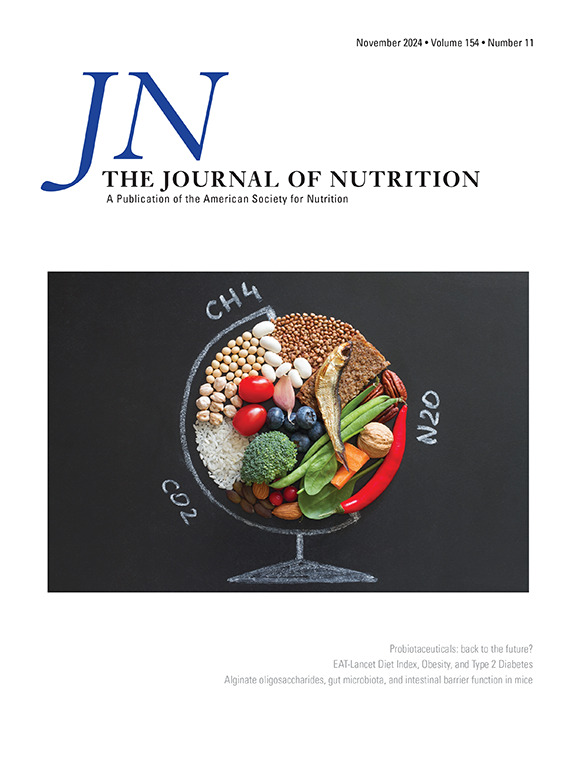鱼油复合脂乳剂对需要长期肠外营养的住院新生儿和婴儿的安全性和有效性 - 一项随机、双盲、多中心对照试验。
IF 3.7
3区 医学
Q2 NUTRITION & DIETETICS
引用次数: 0
摘要
背景:静脉注射脂质对极早产儿和其他高危婴儿的护理至关重要:该研究评估了使用含鱼油的复合静脉脂质乳剂(CO-ILE)与纯大豆油脂质乳剂(SOLE)进行肠外营养(PN)的安全性和有效性:方法:随机、对照、双盲、多中心研究(NCT02579265),对象为因胃肠道畸形或损伤而预计需要≥28天肠外营养的新生儿/婴儿。初始和延长治疗阶段的持续时间分别为 28 天和 84 天(PN 适应症在第 28 天之后的患者):83/78名患者(平均产后年龄:11.4/8.3天,54/59名早产儿)分别接受了CO-ILE和SOLE治疗。每组有 33 名患者完成了 28 天的治疗。在初始治疗阶段(主要结果),第一次采样 7 天后第二次采样确认结合胆红素值大于 2 毫克/分升的风险率为:CO-ILE 为 2.4%(83 例中有 2 例),SOLE 为 3.8%(78 例中有 3 例)(风险比为 0.59 [95% CI:0.09, 3.76])。在第 29 天至第 84 天期间,确诊结合胆红素值大于 2 毫克/分升的患者人数在 CO-ILE 组(2 人)中没有增加,而在 SOLE 组(9 人)中有所增加。在初始治疗阶段结束时,CO-ILE 组的结合胆红素浓度比 SOLE 组低 45.6%(P=0.006)。CO-ILE组患者没有必需脂肪酸缺乏的临床或实验室证据。CO-ILE和SOLE患者出院后存活的中位时间分别为56.7天和66.4天(危险比:1.16;95% CI:0.81,1.68):与接受 SOLE 治疗的患者相比,CO-ILE 可降低高危新生儿和婴儿的胆汁淤积风险,并在初始治疗阶段结束时显著降低结合胆红素。总之,这些数据表明,在高风险新生儿中,CO-ILE 可以被认为是安全的,并且可能比 SOLE 更为可取:临床试验登记号:Clinicaltrials.gov,研究 ID NCT02579265。本文章由计算机程序翻译,如有差异,请以英文原文为准。
Safety and Efficacy of a Composite Lipid Emulsion with Fish Oil in Hospitalized Neonates and Infants Requiring Prolonged Parenteral Nutrition - A Randomized, Double-Blind, Multicenter, Controlled Trial
Background
Intravenous lipids are critical to the care of extremely premature and other high-risk infants.
Objectives
This study evaluated safety and efficacy of parenteral nutrition (PN) with composite intravenous lipid emulsion (CO-ILE) with fish oil compared with pure soybean oil lipid emulsion (SOLE).
Methods
Randomized, controlled, double-blind, multicenter study (NCT02579265) in neonates/infants anticipated to require ≥28 d of PN due to gastrointestinal malformations or injury. Duration of the initial and extended treatment phase was 28 d and 84 d, respectively (for patients with PN indication after day 28).
Results
Eighty-three patients (mean postnatal age 11.4 d, 54 preterm) received CO-ILE and 78 patients received SOLE (mean postnatal age 8.3 d, 59 preterm). Thirty-three patients per group completed 28 d of treatment. Risk of having conjugated bilirubin values >2 mg/dL confirmed by a second sample 7 d after the first during the initial treatment phase (primary outcome) was 2.4% (2 of 83) with CO-ILE and 3.8% (3 of 78) with SOLE (risk ratio: 0.59; 95% confidence interval [CI]: 0.09, 3.76). Between days 29 and 84, the number of patients with confirmed conjugated bilirubin values >2 mg/dL did not increase in the CO-ILE group (n = 2) and increased in the SOLE group (n = 9). At the end of the initial treatment phase, conjugated bilirubin concentrations were 45.6% lower under CO-ILE than under SOLE (P = 0.006). There was no clinical or laboratory evidence of essential fatty acid deficiency in patients in the CO-ILE group. Median time to discharge alive was 56.7 d and 66.4 d with CO-ILE and SOLE, respectively (hazard ratio: 1.16; 95% CI: 0.81, 1.68).
Conclusions
CO-ILE was associated with a possible lower risk of cholestasis and significantly lower conjugated bilirubin concentration at the end of the initial treatment phase in high-risk neonates and infants as compared with patients treated with SOLE. In summary, these data indicate that CO-ILE can be considered safe and may be preferable over SOLE in high-risk neonates.
This trial was registered at clinicaltrials.gov as NCT02579265.
求助全文
通过发布文献求助,成功后即可免费获取论文全文。
去求助
来源期刊

Journal of Nutrition
医学-营养学
CiteScore
7.60
自引率
4.80%
发文量
260
审稿时长
39 days
期刊介绍:
The Journal of Nutrition (JN/J Nutr) publishes peer-reviewed original research papers covering all aspects of experimental nutrition in humans and other animal species; special articles such as reviews and biographies of prominent nutrition scientists; and issues, opinions, and commentaries on controversial issues in nutrition. Supplements are frequently published to provide extended discussion of topics of special interest.
 求助内容:
求助内容: 应助结果提醒方式:
应助结果提醒方式:


